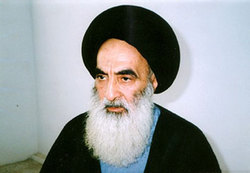 Iraq’s prominent Shia cleric Grand Ayatollah Ali al-Sistani has called on legislators to promptly introduce a fair electoral law that would restore people's faith in elections in the wake of weeks of protests in the capital Baghdad and a host of southern cities.
Iraq’s prominent Shia cleric Grand Ayatollah Ali al-Sistani has called on legislators to promptly introduce a fair electoral law that would restore people's faith in elections in the wake of weeks of protests in the capital Baghdad and a host of southern cities. RNA - “No one can give the government legitimacy but the people... Passing a law that does not provide this opportunity to voters would not be acceptable or useful,” Ayatollah Sistani said in a statement read out by his representative Abdul Mahdi al-Karbalaei during a sermon in the holy city of Karbala on Friday.
In a statement on Saturday, Iraq's embattled Prime Minister Adel Abdul-Mahdi said new electoral reforms would be announced in the "coming few days," but fell short of giving further details.
The 77-year-old also said ongoing protests are important in bringing about reform, but must allow for a return to normal life.
“The protests have helped and will help pressure political groups, the government ... to reform and accept change,” Abdul-Mahdi said at the time.
He added, “However continuing protests must allow for a return to normal life, which will lead to legitimate demands being met.”
Ayatollah Sistani also said on Friday that Iraq will be deeply marked by weeks of demonstrations demanding sweeping reform, urging authorities to enact the necessary reforms in response to the anti-government demonstrations.
“If those in power think that they can evade the benefits of real reform by stalling and procrastination, they are delusional,” the revered cleric said.
“What comes after these protests will not be the same as before, and they should be aware of that,” Ayatollah Sistani pointed out.
He also lambasted government promises of reform as too little and too late.
“In response to the protesters' demands, nothing notable has been achieved on the ground so far,” Ayatollah Sistani said.
On Thursday, senior Iraqi Shia cleric and political leader Ammar al-Hakim said problems in the crisis-stricken country must be resolved without any foreign intervention, and that solutions to such troubles must be “indigenous and homegrown.”
Speaking in a meeting with US Ambassador to Baghdad Matthew Tueller, Hakim stressed “the need for purely Iraqi solutions to all crises of the country away from any foreign interference.”
The cleric added that the National Wisdom Movement – the opposition political coalition which he leads – is “following on and monitoring the reform steps taken by the government to ensure that the demands of protesters are met.”
Protesters in Iraq have directed their rage at a class of elite leaders, whom they accuse of pillaging the oil-rich country's wealth while the population grows poorer.
The protests, which began more than a month ago, have often turned violent.
Abdul-Mahdi has vowed that the government and judiciary would continue to investigate the deaths of the protesters, and that all demonstrators who have been arrested in the past several weeks would be released.
According to President Barham Salih, the prime minister is willing to resign if parties agree on a replacement.
847/940